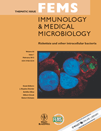Protein candidates for Q fever serodiagnosis
Abstract
The discriminatory diagnosis of Q fever remains difficult because of the unspecific clinical presentations of the disease. Additionally, the diagnosis is often delayed because serodiagnosis is not sensitive enough in the early stages of the disease when the immune response is not yet efficient. Similarly, the diagnosis of Q fever endocarditis can only be performed in approximately 35%, mainly via serology, which was a criterion postulated by Duke. Owing to the discriminatory diagnosis of Q fever and the high number of tests requested, we focused on expressing several proteins for ELISA studies with Coxiella burnetii-infected sera. Previously, we selected a list of 31 candidates [Sekeyova et al. (2009) Eur J Clin Microbiol Infect Dis 28: 287–295], of which we have successfully cloned and expressed 21. Finally, 15 recombinant proteins were prescreened with the sera of patients with acute Q fever and Q fever endocarditis, respectively. Sera from a control group were also screened. The nine most immunoreactive proteins from the first assay were tested with the sera from a larger group of patients. Our study identified CBU_0092 as the best marker of acute Q fever but failed to isolate a highly specific and sensitive marker of Q fever endocarditis.




